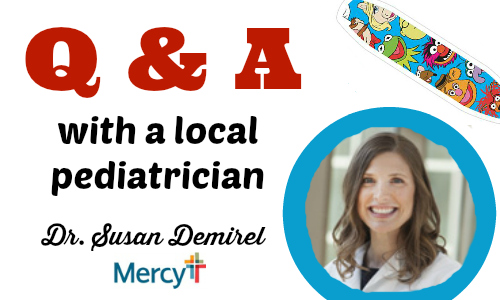 One of our favorite things to do is pick the brain of a real expert on children’s health. We always learn so much when we do. Here’s a recent question and
One of our favorite things to do is pick the brain of a real expert on children’s health. We always learn so much when we do. Here’s a recent question and  answer session we had with a local pediatrician at Mercy — Dr. Susan Demirel. She offers some valuable insights on which problems concern her most about today’s kids, what to look for when you’re Googling your kid’s symptoms (yes, we do that, too) and some sweet thoughts about the best part of her job as a pediatrician. Read and enjoy.
answer session we had with a local pediatrician at Mercy — Dr. Susan Demirel. She offers some valuable insights on which problems concern her most about today’s kids, what to look for when you’re Googling your kid’s symptoms (yes, we do that, too) and some sweet thoughts about the best part of her job as a pediatrician. Read and enjoy.
What’s the most challenging part of being a pediatrician today?
Seeing a child suffering is, by far, the hardest part of my job. The second hardest part is seeing his or her parents suffering through the illness with them. For better or worse, I have a huge sense of empathy that often leads to sleepless nights hurting for the families I work with but also leads to incredible relationships with that family.
What pediatric health problems concern you most about today’s kids?
Preventable ones. There are so many horrible things in this life we have no control over. However, there are some major health concerns in the pediatric population that we can not only do something about but we can prevent entirely. A few examples are the child who keeps having extreme asthma attacks that are triggered by smoke exposure, safety issues like never leaving your child around any sort of water unsupervised (bathtub and toilet included), and various forms of obesity.
What do you wish more parents understood about keeping their kids healthy?
I wish more parents understood that Antibiotics aren’t the answer to keeping their kids healthy. Sometimes they help – a lot. However, many times antibiotics don’t help at all and can even cause harm if they aren’t needed. For example, Viral upper respiratory tract infections (colds) can be miserable for anyone (and even last up to two weeks!) but not even the strongest antibiotic will do any good if the child has a viral infection and not a bacterial infection.
What are pediatricians and their nurses doing to help decrease the fear that some kids feel about going to the doctor?
Going to the doctor can be really scary – for children and adults alike! There are several things, as pediatricians, we try to do to put the kids at ease. Most of my partners and I don’t wear our white coat because that is often intimidating and scary for young children. We try to stay positive and encouraging all while being honest with the kids. There are little tricks to the trade to establish good rapport and put them at ease (i.e. a blood pressure cuff is “giving a little hug” to their arm) that we use pretty consistently. While it is often very age appropriate to have some stranger anxiety, we are usually able to become fast friends with the kids which usually helps a lot. Also, I don’t promote a lot of TV watching but Doc McStuffins sure has helped ease many little girls’ fears of the doctor’s office!
As you know, moms get worried and tend to Google their child’s symptoms. In what situations do you advise parents to do their own research and when does that sometimes cause problems?
Having well educated parents who are invested in their child’s health is priceless! However, most clinics have an on call line to call 24/7 if something is really worrying the mother. However, if a mom absolutely must Google, a good generality is to avoid the “.com” websites. Try to stick more with the “.org” or “.gov”. And if you plan on visiting your doctor after Googling, remember that your doctor and nurses have had years of experience and education addressing these issues – things that the internet just can’t offer. That being said, moms also have a sixth sense about their own child if something just doesn’t feel right. So, don’t be afraid to express your concerns and gestalt feeling about the situation when you do go to the doctor.
Is there a good rule-of-thumb for deciding when a child is contagious and when he’s not?
Every infection is a little different. However, typically when the child has not had a fever (without using Motrin or Tylenol) for over 24 hours, are feeling back to themselves and drinking well, it is typically safe to go back to school. However, every infection is a little bit different, so feel free to ask your doctor about specific conditions and their contagiousness.
Are there any current trends that are impacting the way pediatric medicine is practiced today?
The practice of medicine is always changing. Currently there have been a lot of changes with documentation requirements, Electronic medical records, insurance reimbursements, and billing and coding changes. However, the foundation of pediatrics has not changed – as the American Academy of Pediatrics states, our mission is to attain optimal physical, mental and social health and well-being for all infants, children, adolescents and young adults
What are the best parts about your work as a pediatrician?
The smiles. And hugs. And little drawings my patients make for me. The kids are and always will be the best part of my job. It is rare that I leave a clinic room not smiling from the sweet child I was just blessed to care for.
Our sincere thanks to Dr. Susan Demirel for answering our questions! Click HERE to read more about the pediatric clinic at Mercy.






